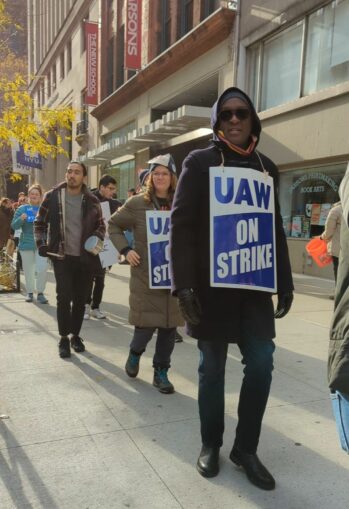New School adjunct faculty strike enters third week
New York City
Dec. 5 — Raucous twin picketlines at the New School University Center and at neighboring Parsons School of Design in support of striking faculty declared their anger at the intransigence of the school administration. Honking cars and trucks, banging on buckets, tambourines and trumpets accompanied chants of “The teachers have spoken: the strike will not be broken!” and “Stand up, sit down, New York is a union town!” to make downtown Fifth Avenue a noisy center of struggle.

New York, Dec. 5, 2022. WWPhoto: Paddy Colligan
Part-time faculty at The New School have been on strike since Nov. 16. Demands include wages and benefits, but the 1,600 members of Adjuncts Come Together-UAW (ACT-UAW) Local 7902 are also demanding that the administration work to resolve issues of inequality that plague the institution.
Despite its progressive history as a haven for academics persecuted in 1930s Nazi Germany, and similarly persecuted scholars of color after World War II, The New School still has to answer for its anti-union and anti-worker actions.
Today’s treatment of its part-time academic staff resembles all too well the unequal business model of many private institutions of higher education in the United States. Adjunct teachers, who provide over 87% of university instruction, cannot be expected to solve budget deficits. Organizing and strikes are trending, as U.S. higher education institutions try to impose shockingly inadequate pay on part-time faculty.
After 95% of the union members voted to reject what the university administration called its final offer, the contract dispute was submitted to mediation, which began Dec. 1 and continued over the weekend.
ACT-UAW members have been joined on daily picket lines by others from The New School community, both workers and students, and by union members from other colleges and universities in New York City, many of whom face their own contract issues.
A lawsuit by parents of New School students, to be filed Dec. 4, accuses the University of fraud for not providing services the parents had already paid for.

